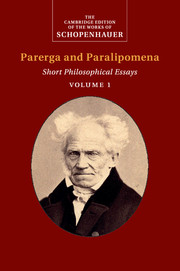Book contents
- Frontmatter
- Contents
- General Editor’s Preface
- Editorial Notes and References
- Introduction
- Notes on Text and Translation
- Chronology
- Bibliography
- Parerga and Paralipomena: Contents
- Preface
- Sketch of a History of the Doctrine of the Ideal and the Real
- Fragments for the History of Philosophy
- On University Philosophy
- Transcendent Speculation on the Apparent Deliberateness in the Fate of the Individual
- Essay on Spirit-Seeing and Related Issues
- Aphorisms on the Wisdom of Life
- Chapter I Fundamental Division
- Chapter II What One Is
- Chapter III What One Has
- Chapter IV What One Represents
- Chapter V Counsels and Maxims
- Chapter VI On the Different Stages of Life
- Versions of Schopenhauer’s Text
- Glossary of Names
- Index
Introduction
Published online by Cambridge University Press: 30 June 2022
- Frontmatter
- Contents
- General Editor’s Preface
- Editorial Notes and References
- Introduction
- Notes on Text and Translation
- Chronology
- Bibliography
- Parerga and Paralipomena: Contents
- Preface
- Sketch of a History of the Doctrine of the Ideal and the Real
- Fragments for the History of Philosophy
- On University Philosophy
- Transcendent Speculation on the Apparent Deliberateness in the Fate of the Individual
- Essay on Spirit-Seeing and Related Issues
- Aphorisms on the Wisdom of Life
- Chapter I Fundamental Division
- Chapter II What One Is
- Chapter III What One Has
- Chapter IV What One Represents
- Chapter V Counsels and Maxims
- Chapter VI On the Different Stages of Life
- Versions of Schopenhauer’s Text
- Glossary of Names
- Index
Summary
In June 1850 Schopenhauer had completed his two-volumework Parerga andParalipomena, and was looking for apublisher. He sent a letter to F. A. Brockhaus, whohad previously published his The World as Will and Representation,and explained how he viewed the new offering:
Now, after six years’ work, I have completed mymiscellaneous philosophical writings: thepreliminary drafts of them stretch back 30 years.For in them I have set down all the thoughts thatcould find no place in my systematic works. Hencethis one is, for the most part, also incomparablymore popular than everything up till now, as youcan see from the list of contents that I include.After this I do not propose to write anythingmore; because I want to prevent myself frombringing into the world weak children of old agewho accuse their father and vilify hisreputation.
Schopenhauer was 62 years old and would live foranother decade. But in that final ten years heproduced only revised versions of the works thatwere already behind him in 1850: The World as Will and Representation,On Will in Nature and The Two Fundamental Problemsof Ethics. The contents of the new,popular work were already settled, and Schopenhauerrequested only a small honorarium, but Brockhausturned the proposal down, and Schopenhauer asked hisfriend Julius Frauenstädt for assistance in findinganother publisher. As a result of Frauenstädt'sefforts Parerga andParalipomena was finally published in1851 by A. W. Hayn of Berlin. Schopenhauer specifiedthat there was to be a print-run of only 750, and nohonorarium at all.
In describing these writings as ‘miscellaneous’Schopenhauer used the word vermischt, which might also be renderedas ‘mixed’. Indeed his Latin phrase for them in hisletters is operamixta. But his characteristic love of alearned phrase from an ancient language had led himto choose two Greek words for his title: parerga meaning ‘subordinateworks’ or works ‘apart from the main business’,paralipomena things‘left aside’ or ‘passed over’.
- Type
- Chapter
- Information
- Schopenhauer: Parerga and ParalipomenaShort Philosophical Essays, pp. xii - xxxiiiPublisher: Cambridge University PressPrint publication year: 2014



